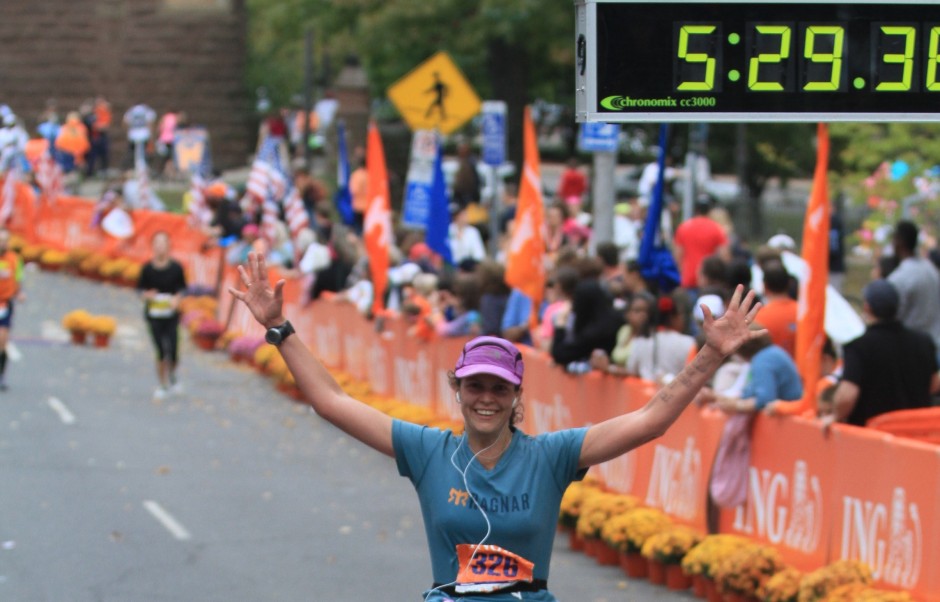Unbelievably, the Boston Athletic Association posted the cutoff time for the 2020 Boston Marathon just a few hours after this post was originally published: 1:39. That’s my exact cushion. As I understand it, I would have been accepted to run Boston with zero seconds to spare. I’m happy I would have got in and I’m still really happy with my 10K plan. Read on to learn all about it!
Cross-posted from Salty Running.
This past week, I did not do a thing. Well, I did many things, but I did not do one thing in particular: register for the 2020 Boston Marathon.
I have a qualifying time, though it might not be enough to get me in. I fought for every second of that cushion last April as I ran from Hopkinton through Ashland, Framingham and the rest of the towns into downtown Boston. I knew that every second counted and I ran to maximize those seconds. So why am I not even signing up?
 It’s not that I don’t love Boston. I ran it last year for the first time. I had a fantastic weekend with my family and friends, and I ran a great and satisfying race. If those things weren’t true, I’d probably be more tempted to go back. I’d also be lying if I said I didn’t have a tiny slice of regret in my heart about my decision not to throw my hat in the ring.
It’s not that I don’t love Boston. I ran it last year for the first time. I had a fantastic weekend with my family and friends, and I ran a great and satisfying race. If those things weren’t true, I’d probably be more tempted to go back. I’d also be lying if I said I didn’t have a tiny slice of regret in my heart about my decision not to throw my hat in the ring.
But despite the Boston hoopla – which I fully embrace! – running the Boston Marathon every year has never been my goal as a runner. I want to run my fastest possible marathon. It’s a goal I share with Des Linden, who says she runs out of curiosity – how fast can she get? Eliud Kipchoge, perhaps the world’s greatest ever marathoner, says “I don’t know where the limit is, but I hope to go there.” Kipchoge’s limit is not in the same neighborhood as mine, possibly not on the same continent, but still – I am looking for my limit too, not Boylston Street.
I love the marathon, but I am not hunting down a flat, fast 26.2 course instead of Boston. Instead, I’m going to take a season entirely off of marathoning and train for the 10K distance instead. Why? I believe 10K training will ultimately help me improve at the marathon distance.
The marathon depends largely on your aerobic capacity, that is, your ability to run when your body has enough oxygen to power your muscles and move you forward through space. About 95-99% of your energy needs in the marathon come from your aerobic capacity. That’s why the majority of marathon training consists of running easy miles. That’s also why the internet is full of articles urging runners to take their easy days truly easy. I wouldn’t argue with any of that.
At some point, though, a faster marathon depends on more than just easy miles. It surely also matters how quickly you’re moving while still running easy. More easy miles will help, but so would improved running economy, a higher VO2max, and a better lactate threshold. Those aspects of running can be improved more effectively through the faster training paces that are a greater focus when working on shorter races. Running marathon after marathon means training the same “energy system” over and over again. At some point, you might get more payoff by working on a different system.
I’m hoping the 10K distance is a sweet spot. It’s fast enough running that I should get some improvement in VO2max, running economy and lactate threshold, but let me keep my mileage high enough to maintain the aerobic capacity I’ve built up over the last few marathon cycles.
There’s an old adage often attributed to Abe Lincoln: “Give me six hours to chop down a tree and I will spend the first four sharpening the axe.” I’ve been working on stronger arms to swing the axe for the last few training cycles – this spring, it’s time to sharpen the axe.
Have you ever switched to shorter distances to improve your marathon speed?

Well put! It’s a train of thought I may pursue. Best of luck with your running!
I honestly love that you are focused on a longterm goal that means more to you than on the goal that seems to be every [fast] runner’s default goal. Boston and the NY Marathon are amazing experiences, I’m sure, but they aren’t the pinnacle of running. The obsession can get a little boring to read about.
I’m looking forward to reading about your 10k plan and how it will benefit you in the long run in chasing your fastest marathon!